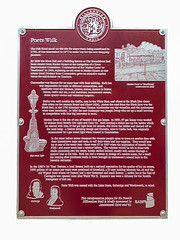Poets Walk
Poets Walk
man
Aged unknown
Commemorated on 1 plaque
Poets Walk The Fish Hotel stood on this site for many years, being mentioned in 1790. It was demolished in 1972 to make way for the new shopping precinct. By 1826 the Moot Hall and a building known as The Roundabout had been cleared from Market Square at the instigation of a Town Improvement Committee. Construction of the ‘Market Cross' or ‘Bandstand’ in 1983, replacing an old cross in Market Square as one enters Great. Dockray from Cornmarket, gives an attractive market venue for stall holders on Tuesdays. Cornmarket was famous for its many inns with their stabling, Each inn was responsible for trade in different commodities, and landlords were also farmers, joiners, slaters, dealers in butter, bacon, cantle and tea, a coal merchant, monumental mason, stone quarry owner and vetinerary surgeon. Barley was sold outside the Griflin, oats by the White Hart, and wheat at the Black Lion (note date stone on the present Board and Elbow 1624). Across the road from the Black Lion was the Black Bull, in the 1790 directory when Thomas Marthwalte was the victualler, and the innkeepers were corn merchants. In 1834 the new innkeeper was Joseph Irving who set up a small brewery in competition with four big breweries in town. Market Cross is the site of one of Penrith’s first gas lamps. In 1850, 57 gas lamps were tended by stokers from Penrith Gas light and Coke Co. Each evening a stoker ran up the Jadder which he carried with him, it the gas light from his lantern, slid down the ladder and dashed off to the next lamp. A former drinking trough and fountain, now in Castle Park, was originally surmounted by a gas street light when located in Cornmarket. In the years before motor transport the country people came to town on market days with their horsedrawn was and carts, to sell their wares and buy supplies. They would put up at one of the many inns - there were 57 in 1907 when the population of Penrith was 9182 - and many more inns a century before, The vehicles would be left in front with shafts projecting into the street, horses stabled behind, mostly with access through a narrow lane at the side. Each inn had a woman in charge of a market room, for a small fee looking after purchases made in town brought by tradesmen's errand boys to the hostelry indicated. In the 1930's Mr ‘Tom' Dayson, a local farmer, built up a national reputation for the quality of his ice cream. 1000 gallons of ice cream per week were produced at Crossfield, a 50 acre holding between the A6 and the Old Wigton Road where Mr Dayson har a new farmstead and small factory. A coffee bar at the foot of Castlegate was opened soon after World War I. Dayson's ices were a delicacy for the Penrith youngsters of thane era. Poets Wall was named with the Lakes Poets, Coleridge and Wordsworth, in mind.
Corn Market, Penrith, United Kingdom where it was

